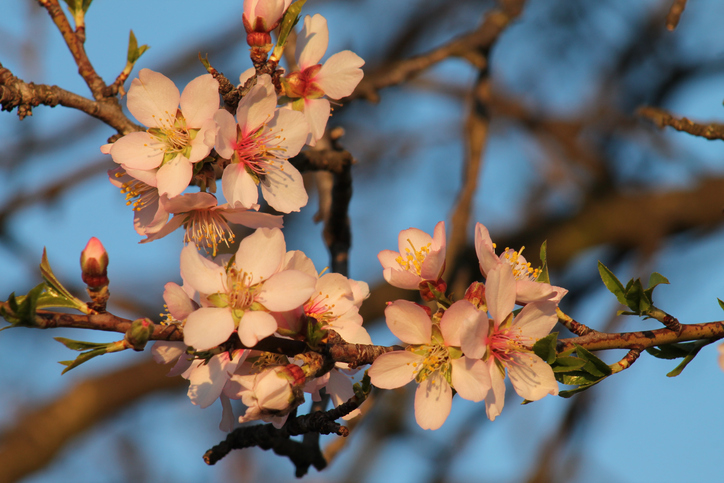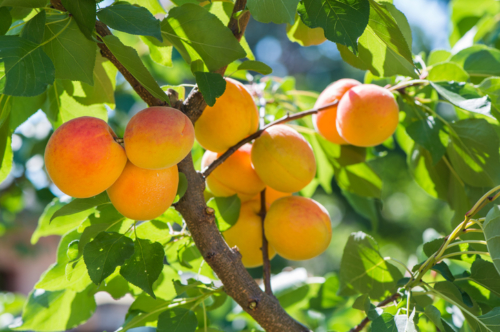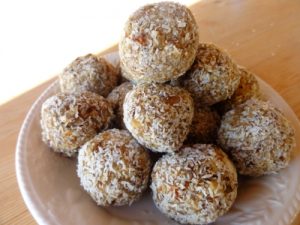Small orange yellow apricots with their velvety skin have a smooth sweet delicious flavor are one of the top healthy fruit superfoods. They may be small but apricots are packed with essential vitamins and health benefits.
6 Health Benefits of Apricots
1. Antioxidant Rich
We need antioxidants to protect our body from the damage caused by free radicals. Health experts believe this damage may be what instigates the development of cancer, heart disease, and other diseases.
Learn more about Antioxidants.
The best way to get the most antioxidants from apricots is to choose a fully ripe apricot according to research.
2. Great for Digestion and Preventing Constipation
They are a good source of dietary fiber whether they are fresh or dried. Just two apricots will give you almost 10% of the daily quantity of fiber required and one dried apricot provides 12%.
The Japanese apricot dried was found to be very helpful in this area.
3. Protects Eyesight
It was found that apricots did a better job of keeping eyesight healthy than carrots as stated in Prevent Disease. They found in the Archives of Opthalmology, a study stating that people eating 3 or more servings of fruit per day lowered the risk of age-related macular degeneration.
They are rich in the carotenoids (vitamin A) and xanthophylls nutrients which are helpful in protecting eyesight from damage.
4. Helpful for Colon Cancer
When a study investigated the effects of the Japanese apricot (Prunus mume) extract against colon cancer they found that it helped the malignant cells to self-destruct.
5. Protection Against Heart Disease
They are rich in antioxidants, including polyphenolic antioxidants like flavonoids. It has been found that when a diet is rich in flavonoids and the other types of polyphenols found in apricots there is a decrease in heart disease.
6. Helpful for Earaches
The oil from apricot seeds is used for earaches; more research is needed. It is believed by scientists that it is the antioxidants in the apricot oil that helps.

Apricot Nutrition
There are only about 74 calories in a cup of raw apricots!
There are over one million grams of beta-carotene which supplies 20% of your daily vitamin A requirement in one ounce of dried apricots. Do note that dried apricots are over 40 percent sugar!
They are an excellent source of vitamin A and a good source of potassium, vitamin C, and dietary fiber. Learn all about fresh apricot nutrients.
Apricot Trivia
- Apricots were once called “moons of the faithful” in China and were thought to enhance women’s fertility.
- Astronauts ate dried apricots on the Apollo moon mission.
- Apricot means ‘precious’ in Latin because it ripens earlier than other summer fruits.
- Almost 90% of the world’s production of apricots is in California.
- More than half the apricots grown are canned due to their short season.
- There are around 10 varieties of apricots commonly found in North American markets.
- The apricot seeds were used for the treatment of ulcer, tumors and swellings by the English in the 17thcentury.

Apricot History
Apricots were cultivated in China over 4000 years ago and made their way to the Mediterranean.
Spanish explorers brought the apricot to the south of San Francisco in 1792.
The only thing better than this is an apricot in Damascus (Turkish expression, which means “it doesn’t get any better than this”)
How to Pick the Best Apricot
The best time is to get fresh apricots when they are in season and it is a very short season. I always make sure I get them at my favourite farmer’s market stall the first time I see them, and up here in Canada, it is at the beginning of July. In the Northern Hemisphere, it is (approximately mid-May to July/August) depending on where you live. In Southern Hemisphere, it is from November to January.
Select firm apricots which are plump, slightly soft and are a deep orange or yellow/orange colour, not a pale yellow colour. Small ones are usually the tastiest as they have not been overwatered to make them grow larger. When apricots are ripe they need to be handled with care as they are very delicate. Ones that are too firm haven’t been tree-ripened, and tree-ripened fruit always tastes the best and are full of the most antioxidants.
Pick fruit that is unblemished as they bruise easily. Overripe bruised apricots do make good sauces and are tasty in baking. I often get bruised fruit at a bargain price at my local farmer’s market so keep your eyes open for them. Do remember to use overripe ones immediately.
How to Store Apricots
Store ripe ones in a refrigerator in a sealed container keeping them separated up to one week. They must already be ripe, as they will not ripen in the refrigerator.
To ripen them place in a paper bag out of direct light, keeping them at room temperature until they have softened a little (usually within 2 – 3 days).
Enjoying Apricots
Wash them gently in cold water and pat dry with a soft cloth. Best to eat them when they are ripe with the skin to get all the nutrients.
Add them to salads.
You can freeze them but they will become soft, but this makes them great for making a sauce or puree.
Recipes with Apricots
These are two of my favourite apricot recipes
-
- Delicious Apricot Peach Smoothie– This apricot peach smoothie is delicious for the summer and so easy to make.
- Raw Apricot Coconut Balls – These yummy raw apricot coconut balls are a fun and easy recipe to make. It’s always nice to have a few of these on hand.

100+ Superfoods
Learn more about some of the healthiest vegetarian fruits, vegetables, herbs and such that you will always want to have in your pantry or growing on your deck.
READ: Superfoods – Over 100 of the Healthiest Foods You Should Have in Your Diet and learn more about the variety of Superfoods we think you should have in your diet.


Never thought that this tiny fruit can do so much to our body! Great article folks!